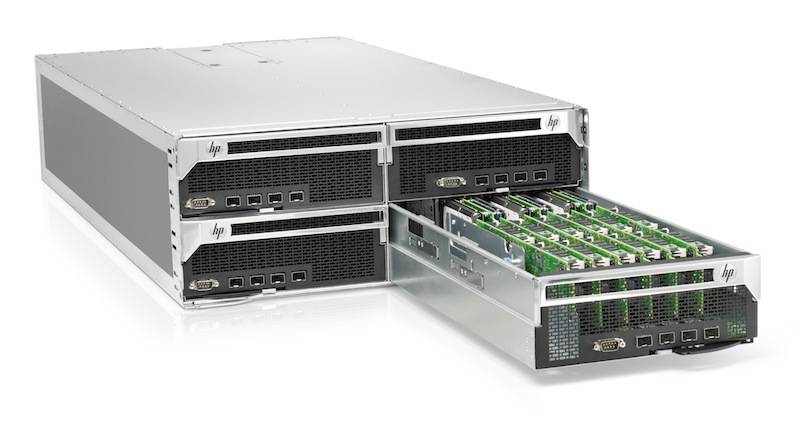With its fingers in so many different pies, it is hard to imagine a world where Hewlett-Packard would be in trouble. But even with its diverse business operations, the venerable HP is still spiraling down. A lot of things will have to happen to reverse this slide, not the least of which is the success of HP’s Moonshot servers.
The company released its Q3 financials yesterday afternoon, with sales numbers of $27.2 billion—okay, but still short of what analysts were expecting ($27.3 billion).
To give you an idea of the overall damage, here’s how the year-over-year PC numbers shook out: Consumer PC sales revenue dropped 22%, and commercial PC revenue fell by 3%, bringing combined PC revenue down 11%. Desktop unit sales declined by 9% and 14% less notebook PCs were sold in the quarter.
Given the steady drumbeat of reports from analysts and manufacturers, this is hardly a shock. PC sales are down for everybody, with HP no exception.
Besides the slip in PC sales, the company even said sales were decreasing in its printing division. Like PCs, mobile device adoption could be hurting print sales, too: even though unit sales were up, people may be less likely to print documents when they can simply pull the document up on a mobile screen. This could explain the 4% reduction in print supply sales.
The real eye opener was in the Enterprise Group and Enterprise Services, each of which saw their revenues down by 9% year over year. From the press release:
Enterprise Group revenue declined 9% year over year with a 15.2% operating margin. Networking revenue was flat, Industry Standard Servers revenue was down 11%, Business Critical Systems revenue was down 26%, Storage revenue was down 10% and Technology Services revenue was down 7%.
Enterprise Services revenue declined 9% year over year with a 3.3% operating margin. Application and Business Services revenue was down 11% and Infrastructure Technology Outsourcing revenue declined 7%.
That represents some real pain for HP, which is no doubt why CEO Meg Whitman had announced the replacement of Dave Donatelli with COO Bill Veghte as head of the Enterprise Group prior to the earnings announcement. Whitman specifically called out the group during the earnings conference call.
“What has changed about 2014’s outlook is a couple of things… Enterprise Group’s performance especially during the quarter,” Whitman said. “Weak execution has amplified the market challenges we know exist.”
The Enterprise Group sells servers, storage and software services to enterprise customers, all areas that would seem to have potential for growth. It is not clear what Whitman meant by “weak execution,” but one guess might be the global decline of server sales that has been indicative of five of the last six reported quarters.
IDC reported back in May that 1Q server revenue had dropped 7.7% from the previous year. At that time, HP was still first in the market with 26.9% of server market share, followed closely by IBM at 25.5%.
See also HP Moonshot: We Have Ignition. Now Let’s See About Liftoff
There still may be a way for HP to pull itself out of this slump, at least on the enterprise side. Its new Moonshot servers have the potential to generate some revenue for the company.
Moonshot servers are small, cartridge-like devices only take up 6% of a current server’s space. Cartridges can be slotted into enclosures that will hold 45 of the microserver units. It is estimated that a standard server rack can hold anywhere from 10-40 enclosures.

Moonshot devices could be more attractive because their architecture is well-suited for the very thing that is hurting the server market overall: virtualization. When you can pack more virtual servers into a single physical server, then you are going to buy less hardware. Moonshot servers, besides being power-sippers, are also tailor-made for software-defined configuration between and within individual Moonshot nodes in a cluster.
If Moonshot sales take off, this will be the boost HP needs. Enterprise revenue alone won’t save HP, but there’s a lot of money to be made in the enterprise market, so progress there will be a very necessary component of a successful HP future.

















